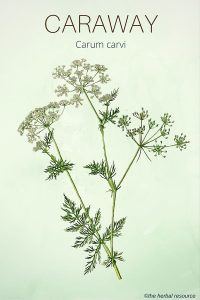The caraway seeds contain 2-7% of essential oil consisting of carvone (45-65%), smaller amounts of limonene, carveol and some other substances.
Furthermore, the seeds contain around 20% fatty oil. Plants that grow in the wild usually contain more oil than plants that are cultivated and have therefore a stronger flavor.
The leaves of caraway are rich in vitamin B and C, as well as iron.
Caraway has been cultivated for a very long time and it was known and described by many ancient civilizations. The seeds of the plant have been found in human settlements dating from the Stone Age and also in Egyptian tombs.
Caraway has various medicinal properties such as antihistaminic, antiseptic, antispasmodic, carminative, and vermifuge.
This medicinal herb has been utilized to get rid of toothaches and it is commonly used as a carminative.
An herbal tea prepared from the seeds of caraway is used as an herbal remedy for digestive disorders, heartburn, loss of appetite, and to dispel worms.
Caraway seems to be a natural treatment for dyspepsia, hysteria, and similar disorders. Also, it is believed to be an effective stomachic.
Distilled water extracted from caraway is believed to be an effective herbal remedy for flatulent colic in infants.
A poultice made from the powdered seeds is believed to be an effective herbal remedy for wounds.
The leaves, roots, and seeds of caraway seem to activate the glands and they increase the functions of the kidneys. Additionally, an infusion prepared from the caraway seeds can help aid digestion, menstrual cramping, and relieve gas.
The caraway seed oil is sometimes utilized orally to get rid of halitosis, bad breath or bad taste. In addition, the oil contains an effective anthelmintic agent, especially against hookworms.

Leave a Reply